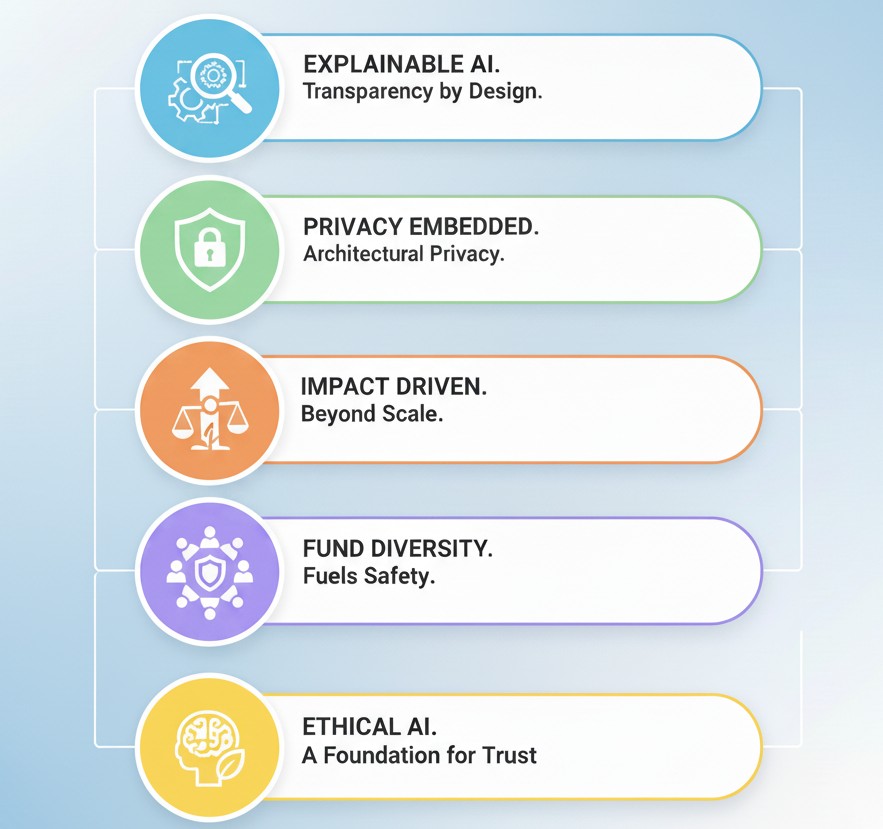
AI Safety in Practice: Startups with Women at the Helm
In today’s AI-driven world, safety isn’t just a technical checkbox; it’s a human responsibility. And that’s where Women in AI are making their mark. From ensuring algorithmic transparency to building privacy-first frameworks, women-founded startups are proving that innovation can coexist with ethics. These founders aren’t merely participating in the AI revolution; they’re reshaping it from the ground up. Their ventures in AI safety, AI privacy solutions, and explainable AI startups are turning big ideas into trusted, real-world systems.
Let’s take a look at how women in AI are turning safety, privacy, and trust into the new currency of innovation.
The rise of human-centered leadership in AI
AI’s rapid expansion has outpaced our understanding of its risks. Bias, misinformation, data breaches, and opaque decision-making have become common. Yet, where some see technical challenges, women leaders see a moral compass problem, and they’re rewriting the rules.
Studies show that diverse leadership drives safer AI. When women lead, they question design biases, test fairness more rigorously, and push for accountability. Still, female representation in the sector remains painfully low, especially in safety-driven AI. Only 2 percent of UK investment deals in AI went to women-led startups over the last decade.
That statistic says a great deal about the barriers and even more about the persistence required to overcome them.
Startups redefining AI safety
Across the world, women founders are building AI that can explain itself, protect its users, and stay accountable. Here are four standout examples of AI companies with real traction and responsible leadership.
Edera: Building the backbone of safe AI
Founded by a team of women engineers, Edera is tackling a silent yet critical risk: data leakage between AI workloads. Its platform isolates cloud containers so that one AI process can’t eavesdrop on another.
It’s a deeply technical challenge with massive ethical weight. By preventing co-tenant data breaches, Edera strengthens the trust that fuels digital collaboration. The startup’s focus on safe infrastructure demonstrates that AI safety extends beyond policy papers; it begins in code.
Thinking Machines Lab: Making explainability accessible
At the helm of Thinking Machines Lab is Mira Murati, known globally for her work in responsible AI. Her new venture bridges the gap between complex AI systems and human understanding. The lab develops explainability frameworks that help teams “see inside” algorithms.
In Murati’s words, “A model you can’t explain is a model you can’t trust.”
Her approach is pragmatic, not about slowing innovation but aligning it with human logic. Thinking Machines is helping businesses adopt transparency by default, not by demand.
Subscribe to our bi-weekly newsletter
Get the latest trends, insights, and strategies delivered straight to your inbox.
SafeToNet: Protecting children through AI
Sharon Pursey’s London-based startup, SafeToNet, takes a compassionate approach to AI safety. Its app uses behavioral AI to detect online risks like cyberbullying, grooming, and sextortion in real time.
Instead of harvesting sensitive data, SafeToNet processes everything on-device, safeguarding privacy while protecting children. It’s a perfect example of AI privacy solutions meeting social purpose. Pursey calls it “digital safety with empathy.”
Pano AI: Safety on a planetary scale
Sonia Kastner’s Pano AI doesn’t just protect data, it protects lives. Using real-time imagery and machine learning, her system detects wildfires before they spread.
Every second matters in environmental crises, and Pano AI’s technology brings both speed and explainability. Kastner’s model of leadership, human, science-driven, and collaborative, embodies what responsible AI can achieve when aligned with global safety.
How women-led AI startups are changing the game
These startups don’t just innovate. They change how innovation is measured. Here’s how Women in AI are shifting the conversation around ethics and impact.
Turning responsibility into a growth strategy
For years, ethics was treated as an afterthought. These founders flipped the script. They build safety into every layer, design, data, and deployment. Their success shows that responsible AI is not charity; it’s a competitive advantage.
Designing for explainability, not opacity
Explainable AI startups, such as Thinking Machines Lab, make transparency an integral part of their product DNA. Users can understand why an algorithm made a decision. This kind of explainability doesn’t just build trust, it reduces compliance risk and boosts confidence across industries.
Protecting privacy with smarter architecture
Edera and SafeToNet prove that privacy innovation happens at the design level. Isolated workloads and on-device analytics keep sensitive data secure. These AI privacy solutions extend beyond encryption; they transform the way data is processed and who controls it.
Creating visibility and influence
Representation breeds awareness. When women run AI companies, they redefine who builds the future. They mentor, hire inclusively, and set new standards for governance. Their work permeates academia, policy, and public debate, expanding the circle of accountability.
 Barriers that still stand in the way
Barriers that still stand in the way
Progress is visible, but so are the challenges.
- Funding bias continues to restrict scale. Investors remain hesitant about female-led or ethically driven ventures. Safety research demands longer development cycles and patient capital, both of which are rare in the startup world.
- Regulatory uncertainty adds another layer of complexity. The UK’s evolving AI Safety Institute and the EU’s AI Act are steps forward, but the standards shift quickly. Founders must balance compliance, innovation, and speed, a difficult trio to maintain.
And then comes talent. Recruiting diverse teams in an industry dominated by men takes effort. But many of these startups prioritize inclusion even when it slows hiring. For them, diversity isn’t just a box to tick; it’s how safety is built.
What big tech can learn from women-led AI startups
The lessons are simple yet profound.

These principles echo across every successful women-founded startup. They remind us that trust is the true currency of the AI era.
Distilled
AI’s power can either illuminate or harm; the outcome depends on who leads it. Women in AI are demonstrating that leadership can be both ethical and practical. Their approach balances innovation with intent.
They’re also redefining ambition. These aren’t startups chasing headlines. They’re building frameworks for long-term resilience. Each one is proof that AI safety doesn’t belong to regulators alone; it belongs to every developer, designer, and leader shaping the digital world. As the industry matures, it will need more founders like Murati, Pursey, Kastner, and the engineers at Edera, voices that bridge ethics and execution. The more women take the helm, the more grounded, transparent, and human AI becomes.
Because at its core, AI safety isn’t about fear. It’s about trust. And trust, as these founders remind us, is something you build, one ethical decision at a time.